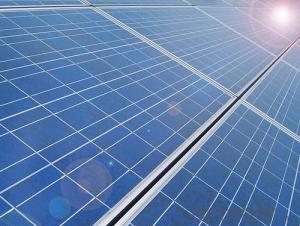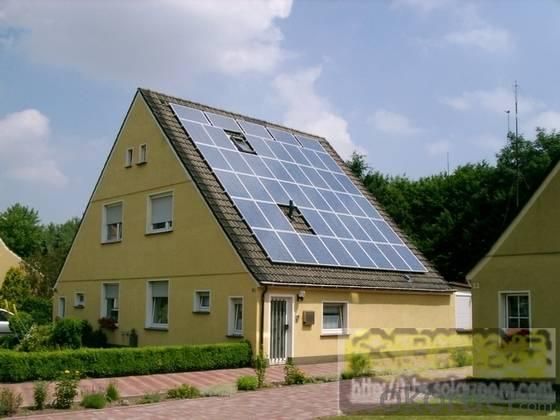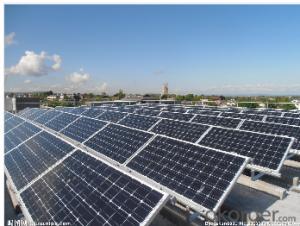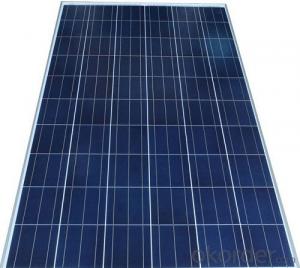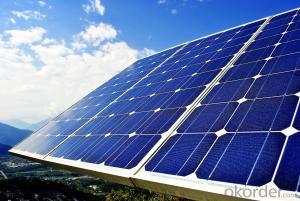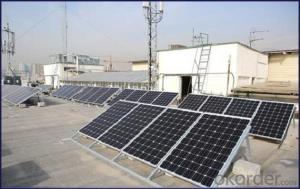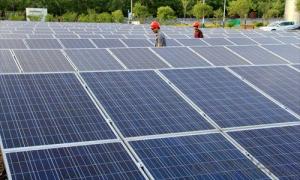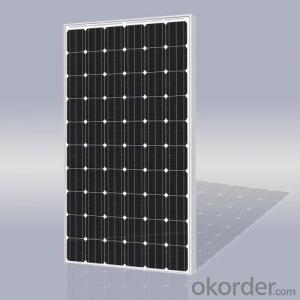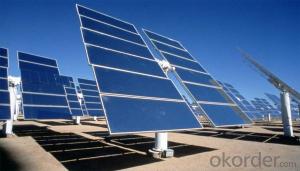CE and TUV Approved 145W Poly Solar Panel - Solar Panels Pittsburgh PA
- Loading Port:
- Shanghai
- Payment Terms:
- TT OR LC
- Min Order Qty:
- 10000 watt
- Supply Capability:
- 20000000 watt/month
OKorder Service Pledge
OKorder Financial Service
You Might Also Like
Specification
1. The Introduction of Solar Module
Solar modules use light energy from the sun to generate electricity through the photovoltaic effect. The majority of modules use wafer-based crystalline silicon cells or thin-film cells based on cadmium telluride or silicon. The structural (load carrying) member of a module can either be the top layer or the back layer. Cells must also be protected from mechanical damage and moisture. Most solar modules are rigid, but semi-flexible ones are available, based on thin-film cells.
2.Technical Parameter
Type | CNBM Solar Polycrystalline Series |
Materials | Silicon |
Guarantee | 12 yrs free from defects in materials and workmanship No less than 90% within 10yrs and no less than 80% within 25yrs TUV(IEC61215&IEC61730), CE, UL |
Application | Photovoltaic/ solar/ green energy/ energy saving |
Descriptions | 1.High efficiency crystalline silicon solar cell. Even if under the weak light, the solar module can produce maximum power output. 2.Tempered glass (toughened glass): Anti-reflecting coating and high transmission rate glass increase the power output and mechanical strength of solar module. 3. EVA and TPT: Using high quality EVA and TPT to prevent destroying and water. 4. AI frame: Without screw, rner connection. 6 holes on the frame can be installed easily. 5. Junction box: Multi function junction box with water proof. 6. Long lifetime: ≥25 years; Less power decrease. 7. Good performance of preventing from atrocious weather such as wind and hails. 8. Resisting moisture and etching effectively, not effected by geology. 9. The certificate issued by international authority: UL, TUV, IEC, CE.
|
Packaging Details: | 26pcs/pallet, 28pallets/ 40HQ Our solar panels are packed in cartons, and then pallet. Shipping by sea or by air are both ok, it up to customer’s chose. We’d like to inquiry the freight cost for customer after be informed exact quantity and destination address. |
3. Application and Pictures of Products
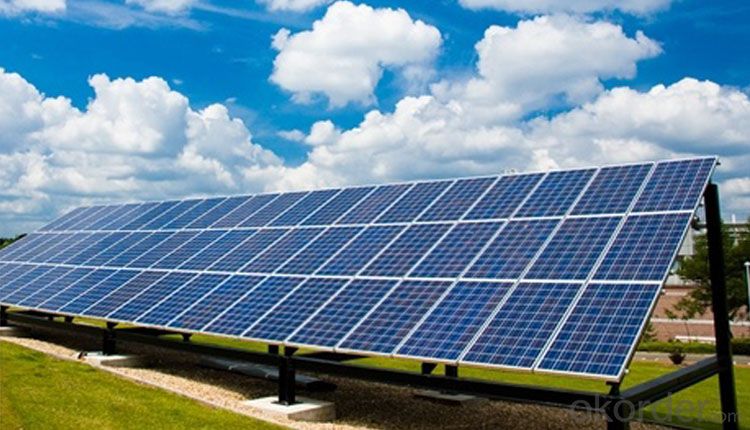
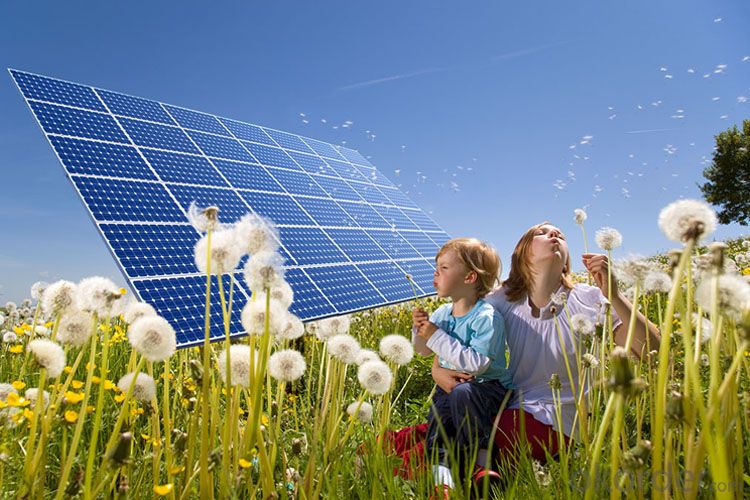
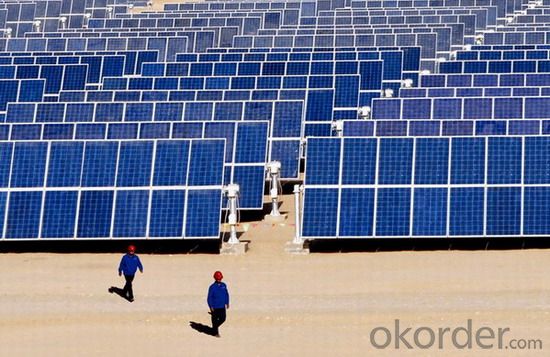
4. How to Work
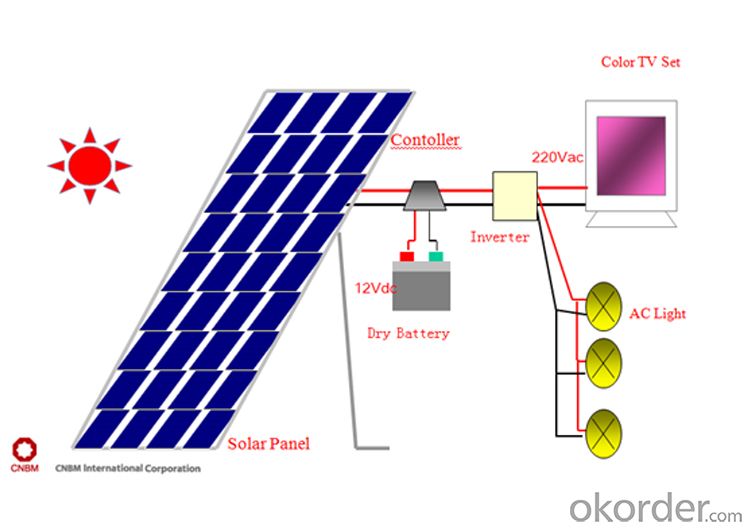
5. Packing Details
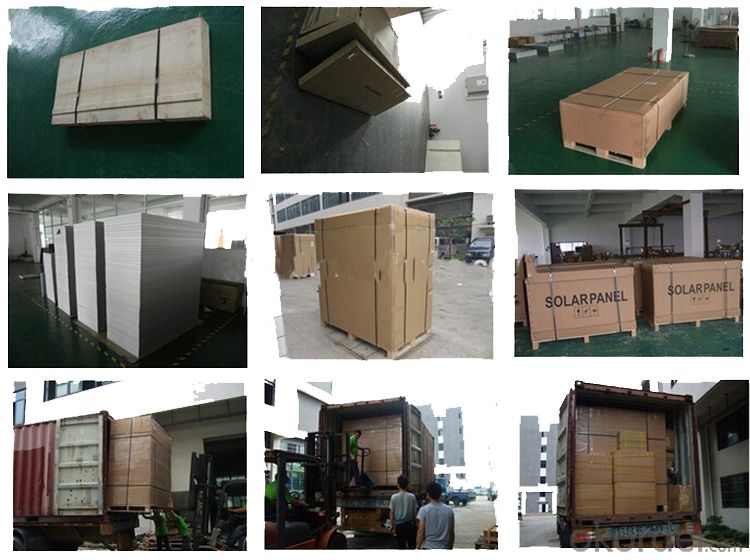
6. FAQ
Q1: What is the business type for the company?
A1: We are one of the biggest manufacturers in zhejiang.Chnia. Which is a high tech PV enterprise dedicated to the research, development, production and sales..
Q2: How long solar panel warranty can you offer?
A2: 10-Year product warranty,25-year linear power output warranty
If there is any quality problem, we will pay for freight and send free parts to you.
Q3: How many certificates do you have?
A3: We have 16 certificates,such as CE, TUV, UL, and so on.
- Q: Hello Yahoo, I am doing another one of my wacky inventions however I need something that will give me 2V of power!I don't want to connect loads of AA batteries into a battery holder as this shall run out quickly and become expensive in the long run, I don't want to carry around a big car battery either.I have been searching around on OKorder .uk and found some Solar-Powered 2V Trickle Chargers. These say they shall work on cloudy days (which is perfect as the majority of the time that is all we get!) but could I use it as an independent power source?If I attached the thing I want to run to the solar panel will it supply it with 2V of power?
- If you want to run something from a solar panel, you should remember that the power from the panel is only available when there is reasonable sunshine on the panel. Usually the solar panels are used with solar regulators in order to charge batteries. These batteries are used as energy storage for when the sun is not shining. Now, this does not mean that you cannot drive instruments directly from the solar panel and regulator. To do this, you will need a panel that has sufficient power to drive your instrument. An example is the solar powered garden or fountain pumps. I have driven 2V computer fans directly from the small solar panels - useful for cooling of things such as pool pump housings. The solar regulator is used to convert the solar panel output to a 3.5V output in order to charge lead acid batteries. I have used MPPT regulators (maximum power point tracking) which is more efficient than the standard solar regulator. If you don't use these regulators you may find the solar panel producing up to 7-9V in good sunshine which is not good for your instruments that are expecting 2-3V. Hence the answer to your question is that you will need to have a battery being charged to get useful power from the solar panels via a solar regulator.
- Q: Ok Im trying to power my room using solar panels and I've figure out that I need about 700 watts to do so, but I really only use my electronics at night. I was wondering if I could buy lets say a 200 watt solar panel and let it charge a battery all day would that work? I live in southern california so I dont have to worry to much about cloudy days. also any suggestions on where to buy a panel, inverter, charge regulator, and battery?
- What you really need to calculate is your energy requirements, you are only stating your power requirements. Power (W) = how many watts of power are you using? Time (h) = how long are you going to use the power for? Energy requirement(Wh) = W * h take the answer to that equation and plug it into the exact same equation except substitute how much sunlight you get for h and then solve for W to find what you need in the way of a solar panel. Wattage of solar panel (W) = Energy requirement (Wh)/hour of sunlight per day (h) Now you know what wattage of solar panel you need. For the battery you use a different equation: Energy in the Battery(Wh) = Battery Voltage (V) * Current Capacity (Ah) Solving for Current Capacity: Ah = Wh / V This will tell you how big a battery you need, but you also need to be concerned about how much current it can source. For this you need to know what your peak power requirement is. Wmax = peak power requirement Max discharge current (Amax) = Wmax / Vmax Also you will need an inverter rated to Wmax as well.
- Q: Can solar panels be installed in shaded areas?
- Solar panels can still be installed in shaded areas, but their efficiency and overall energy production may be significantly reduced. Shading can block sunlight from reaching the panels, limiting their ability to generate electricity. It is always recommended to install solar panels in areas with maximum sun exposure to ensure optimal performance.
- Q: Can solar panels be used in areas with high levels of pollution from industrial activities?
- Yes, solar panels can be used in areas with high levels of pollution from industrial activities. While pollution may have some impact on the efficiency and performance of solar panels, they can still generate electricity even in polluted areas. It's important to regularly clean the panels to maintain their optimal efficiency and ensure maximum energy production. Additionally, investing in advanced technologies and air pollution control measures can help mitigate the effects of pollution and improve the overall effectiveness of solar panels in such areas.
- Q: Can solar panels be installed on a rental property?
- Yes, solar panels can be installed on a rental property. However, it ultimately depends on the landlord's consent and willingness to invest in the installation.
- Q: I have thermal solar panels on my roof. Iive in Colorado
- If it is your own installation, you simply reverse the method of your own installation. If your sunlight panel is set up by using a vendor or a contractor, you need to speak to them for the cost of removing your thermal sunlight panel.
- Q: How do solar panels affect roof maintenance?
- Solar panels can have both positive and negative effects on roof maintenance. On the positive side, solar panels can provide an added layer of protection to the roof by shielding it from harmful elements like UV rays, rain, and snow. This can help extend the lifespan of the roof and reduce the need for repairs. However, solar panels can also make roof maintenance more challenging as they need to be regularly cleaned and inspected to ensure optimal performance. Additionally, any repairs or maintenance work on the roof may require temporarily removing the panels, adding an extra step to the process.
- Q: I need a 2v (500-800ma) solar panel that in can fit on a 24inx4in flat surface. Where can i get one this size and with this power?
- Hey Jeff, what you're talking about is frequently referred to as a, solar battery maintainer. There are lots of places that make and sell them, I have seen them in many auto parts stores and truck stops along the freeways. Go to google and search for a solar battery maintainer, they come is sizes similar to what you are searching for, but it will be difficult to find one that is not over 4 wide. Lots of them are about the size of the top of a shoe box, maybe 2 X 6, and come with a cigarette lighter cord attached. A 2 volt model at 500 ma, or /2 amp, works out to about 9 watts, assuming the 2 volt nominal voltage panel is actually optimized for 8 volts, as most of them are. These devices are designed to sit on the dash board of your car and keep your battery charged if you leave the car for a long period of time, like at the airport for a week in the winter. They actually work for that, we've used one before. What are you planning on doing with it? Charging a battery or running a device directly? Remember if you hook it straight to a device, and the current requirements of the device are less than the available sun will develope with your panel, the voltage may climb to a level too high for your device. If you're charging a battery, this does not cause a problem. Another option is to build your own. It can be a lot of work for just one panel, I've not done it myself, but there are videos on the subject. That device in real goods is a flexible panel, known in the solar world as, Amorphous. They are still a bit experimental, the ones they made a few years ago did not hold up as well as the solid ones, and they are expensive. You can get a /2 amp maintainer for around $25. Good luck Jeff, and take care, Rudydoo
- Q: How do solar panels affect the roof warranty?
- Solar panels can affect the roof warranty in some cases. The installation of solar panels usually requires drilling holes into the roof, which may void certain parts of the warranty. However, many reputable solar companies offer their own warranty and insurance to cover any potential damages caused during installation. It's important to review the terms of both the roof warranty and the solar panel warranty before proceeding with the installation to ensure that you understand any potential impacts on the roof warranty.
- Q: Due to erratic power cuts in my area I want to make up by using a 30watt solar panel. My decoder is 30watt but my TV is 70W. I need something small. I don't have problem with sound. Just picture.
- Do what we do when power is cut (although we have very reliable power - we loose as much as 2 hours a year), is go Amish. That is go without powered technology. Now, for you, you need more than a solar panel (and likely more than 30W, but that is a start) - you need a battery or set of batteries to store the collected power. 20Ah might do. You need an inverter to power things. For that, likely a 300W will do. For a TV, go shopping, and look at the labels on the back of the TVs. I just bought a 24 TV rated at 40W. If you get a 9 LED TV, it may be likely you can run that directly from battery, for many have separate DC brick supplies. With those, you can make a cable to power it directly from a 2V or so battery, if the supply can make 2 to 5V. Depending on your provider, you may be able to get a mini-decoder which uses a separate brick or wall supply, which means the decoder likely can be directly battery powered. Such a decoder may draw less than 20W.
Send your message to us
CE and TUV Approved 145W Poly Solar Panel - Solar Panels Pittsburgh PA
- Loading Port:
- Shanghai
- Payment Terms:
- TT OR LC
- Min Order Qty:
- 10000 watt
- Supply Capability:
- 20000000 watt/month
OKorder Service Pledge
OKorder Financial Service
Similar products
Hot products
Hot Searches
Related keywords
